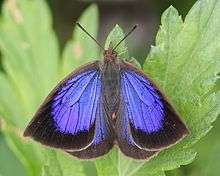August 3, 2015 report
Caterpillar chemical turns ants into bodyguards

A trio of researchers with Kobe University in Japan has found that lycaenid butterfly caterpillars of the Japanese oakblue variety, have dorsal nectary organ secretions that cause ants that eat the material to abandon their fellow ants to instead hang out with and defend the caterpillar against enemies. In their paper published in the journal Current Biology, Masaru Hojo, Naomi Pierce and Kazuki Tsuji describe their research into the relationship between the two creatures and why they believe the nature of that relationship needs to be reclassified.
Scientists have studied Japanese oakblue butterflies before, noting that ants seem to guard the young caterpillars, but until now that relationship was described as reciprocal, both seemed to derive some benefit. The caterpillars got protection and the ants got a nice meal. Now however, according to this new research, the ants may not be willing partners.
In studying the caterpillars in their natural environment, the researchers noted that the ants did not just eat the free meal and leave, instead, they stayed with the caterpillar—that got them to wondering if there was more to the relationship than has been thought.
To find out, they brought several specimens of both creatures back to their lab for testing. Some of the ants were allowed to feed on the caterpillar secretions, while others were not. The ants that ate the secretions stayed with the caterpillar, while those that did not, wandered away. Even more surprising, the researchers found that whenever the caterpillar raised its tentacles, flipping them—the ants became aggressive, actively seeking out enemies, trying to make them go away. The researchers believe flipping its tentacles is a defensive move by the caterpillars. Ants that did not eat the secretions did not attack in response to tentacle actions. The researchers also dissected the ants and found that those that ate the secretions had lower levels of dopamine in their brains, which is usually associated with degree of aggression in organisms. They then gave the ants that had eaten the secretions from the caterpillar a drug called reserpine—it blocks the transport of dopamine. That caused the ants to ignore tentacle flipping and to abandon the caterpillar.
The ingredients in the caterpillar secretions have not yet been identified, but the researchers believe it likely contains chemicals that impact dopamine levels in ant brains, causing them to stay with the caterpillar and to protect it when danger arrives.
More information: Current Biology, DOI: 10.1016/j.cub.2015.07.016
Journal information: Current Biology
© 2015 Phys.org





















